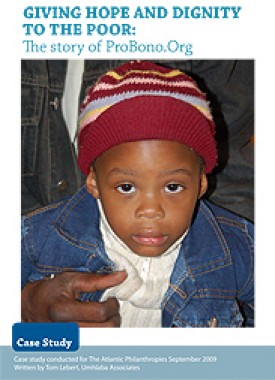Giving Hope and Dignity to the Poor: The Story of ProBono.org
Resource type: Case Study
Probono.Org |
Probono.org, a South Africa clearing house that seeks to increase access to justice through the pro bono services of law firms, provides a model that substantially reduces public interest law costs since it unlocks private legal expertise, according to this case study commissioned by The Atlantic Philanthropies. Atlantic Philanthropies. ProBono.org is an Atlantic grantee.
by Tom Lebert, Umhlaba Associates
In South Africa, immigrants, farm workers, the rural poor, and the gay community are among the population groups regularly denied access to rights, services and justice. The Atlantic Philanthropies supports organisations that use the law to ensure access for the rural poor to the rights and services promised to them under the democratic Constitution. In practice, this means support for organisations providing free legal advice and support to indigent people in rural communities. In some cases the organisations engage in high-impact litigation to effect change, as well as in lobbying and advocacy to influence policy.
The Atlantic Philanthropies programme seeks to:
- support a small cluster of best practice public interest and human rights non-governmental organisations (NGOs) and law firms, selected on the basis of geographical reach and niche activities. This will guarantee the target group a sustainable, national infrastructure of legal support
- support this cluster with an institution-building programme inter alia to secure the longer-term sustainability of participating grantees
- promote networking and coalition-building among the supported grantees to identify key issues impacting most adversely upon the livelihoods of the target group that can realistically be remedied legally
- engage private law firms to provide pro bono legal support to NGOs engaging in public interest law, and
- partner with the Programme for Land and Agrarian Studies to develop an advocacy strategy with regard to these issues.
One of the organisations supported in The Atlantic Philanthropies programme is the non-profit clearing house ProBono.Org, the first public interest law clearing house in South Africa. ProBono.Org aims to increase access to justice via the pro bono services of law firms and advocates, with an emphasis on public interest matters. ProBono.Org has to look to the United States and Australia for role models.
ProBono.Org seeks to harness the vast, specialised resources of the private legal profession to extend and enhance public access to justice. At present government’s Legal Aid Board (LAB) and public interest legal NGOs offer limited access to justice. Deputy Chief Justice Dikgang Moseneke endorsed the work and objectives of ProBono.Org at its formal launch at Constitution Hill in May 2007:
There is a need for ProBono.Org like yesterday. The claims of the ordinary people are not reaching the Constitutional Court […] ProBono.Org is most welcome. These lawyers are doing great services […] The poor are not getting the fruits of the growing economy. Yes, the safety net may have increased but ProBono.Org needs to identify strategically that, which will advance the disadvantaged. If not, poor people know how to look after themselves. They will find other means. We have a duty to get them to use the measured means offered by the court. The legal means.
This case study, written as an easily accessible ‘how-to’ manual or primer for human rights activists and organisations, tells the story of ProBono.Org’s establishment and strategies. The case study shares the organisation’s insights through interviews with ProBono.Org staff, staff in participating law firms and other stakeholders.
